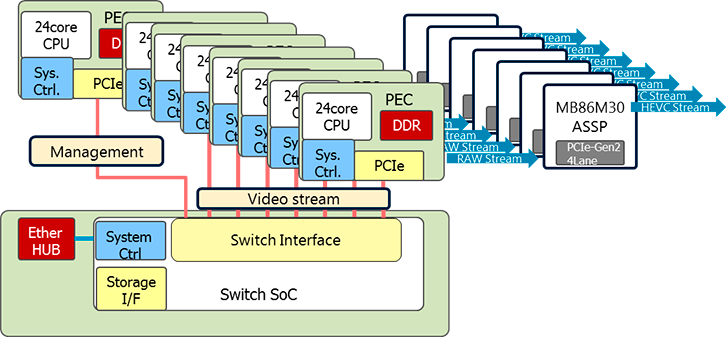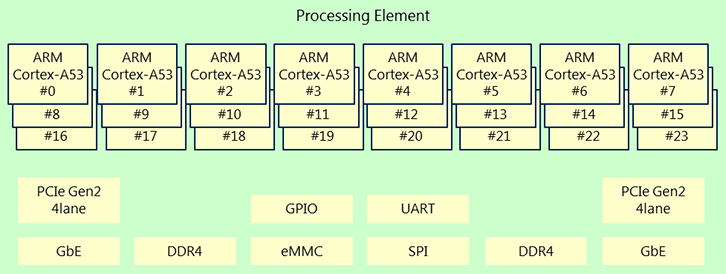Socionext SC2A11 is an 24-core (tetracosa) ARM Cortex-A53 processor designed for low-power server system suitable for edge computing, web server & indexing, cloud computing, and any applications that do not require high single thread peak performance. The company also designed SC2A20 switch SoC that allows up to 64 SC2A11 processors (1536 cores) to communicate over PCI Express using Socionext DDT (Direct Data Transaction).
- Processor – 24x ARM Cortex-A53 MPCore cores @ up to 1GHz, with 32KB/32KB I/D L1 cache, 256 KB L2 cache, and 4MB L3 cache
- Memory I/F – DDR4-2133Mbps 64-bit + ECC
- Flash I/F – HSSPI, eMMC
- PCIe – PCI Express Gen2, Root/Endpoint select, 4 lanes (2 systems/ for SoC IF)
- LAN – 2x 1Gbps with IPSec Network Offload Engine (wire-speed)
- Serial I/F – UART, I2C, GPIO
The company did not provide any info about software, but it’s safe to assume it’s running Linux. There’s some code on the Linux mailing list for other Socionext processor, but nothing for SC2A11. Another interesting use case is to connect several processor element card (PEC) based on SC2A11 using SC2A20 switch SoC, and a few Socionext MB86M30 ASSP via PCIe to encoding raw videos to 4K HEVC / H.265 videos @ 60 fps.

Socionext was at Linaro Connect Budapest 2017 demonstrating some of those PECs, and Charbax checked them out at the demo event, where they showcase the boards, and explained a little about them, and their relation with Linaro (as a member).
You won’t find than many details on Socionext SC2A11 product page, but at least you can inquire the company if you need more information.

Jean-Luc started CNX Software in 2010 as a part-time endeavor, before quitting his job as a software engineering manager, and starting to write daily news, and reviews full time later in 2011.
Support CNX Software! Donate via cryptocurrencies, become a Patron on Patreon, or purchase goods on Amazon or Aliexpress. We also use affiliate links in articles to earn commissions if you make a purchase after clicking on those links.







24 cores sharing 4MB L3 and single 64-bit channel DDR4 sounds like a disaster.
@dx
I can see two DDR4 interfaces in the block diagram, so it could be dual 64-bit channel DDR4.
Looks like an interesting module. If you get the price point, please write it. Would be really interesting.
There certainly are some valid workloads for such machines. Anything highly cpu-bound like encoding/encryption/compression might fit. It depends on the price though, because that’s “only” 24 GHz of A53, and will hardly be on par with an entry-level 2 GHz quad-core i7 you can find for $100 or less. After all, given the per-core performance I measured on my MiQi (quad-A17) showing exactly twice the IPC compared to A53 at the same frequency, 24 GHz of A53 is approximately equivalent to 12 GHz of A17, which is only 6 cores or 1.5 CPUs (ie: pick two MiQi or Tinker and you beat it).
@Willy
Ha! Now I know. Willy is Willy T. 🙂
I also thought about potential use cases for such a design and think code with high locality could fit (years ago I developed an image conversion benchmark which performed quite well on Sun’s Netra machines even with horribly low single-thread performance ‘per thread’). Would also be interesting how larger setups with more than 24 cores perform (I would believe then it’s scheduler time since the SoC interconnects — Direct Data Transaction — are just PCIe 2.x and threads moving between different SoCs could become very expensive)
Off-topic: Already heard of pcDuino9? Could’ve saved you a lot of powering hassles 😉
Yep, I seem to have different identities depending on the browser I’m using, I’m sorry.
Good point, even on a single board with only 4MB L3, there’s less L3 than the total amount of L2 (6 MB) so you absolutely want to pin all your threads or your L3 becomes useless.
Ah thanks, I hadn’t heard about it. It’s quite large and not much space efficient but it seems well designed. Strangely it still doesn’t appear on their product page despite the wiki showing a 9-month old photo. Maybe they’re facing difficulties, the RK3288 is a very powerful beast but not the easiest chip to develop with.
@Willy
You might want to do a web search for ‘Fennec RK3288 Proto’ too for some more info. In the meantime I also remembered a Linksprite guy asking about Armbian support for this board months ago. But we’re getting off-topic (again 😉 )